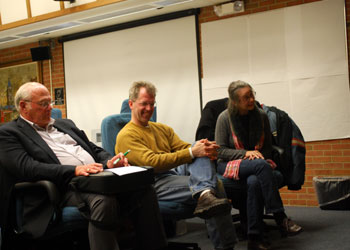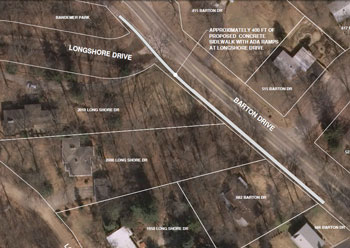Ann Arbor City Council Sunday night caucus (Feb. 28, 2010): The notion of a “first reading” permeated discussion in council chambers Sunday night among the five councilmembers and the half dozen residents who attended. Ordinances must be approved at two readings by the city council before they are enacted.

At the Sunday Ann Arbor city council caucus, from left: Tony Derezinski (Ward 2), Stephen Kunselman (Ward 3) and Sabra Briere (Ward 1). Also attending the caucus from the city council were Mike Anglin (Ward 5) and John Hieftje (mayor). (Photo by the writer.)
Due to receive its first reading on Monday night at the council’s regular meeting is The Moravian – a five-story residential and work/live space planned unit development (PUD) along the 500 block of Fifth Avenue and the 200 block of East Madison. The project was given a recommendation for approval from the city’s planning commission on a 7-1 vote in January 2010. [Chronicle coverage: "Moravian Moves Forward Despite Protests"]
At Sunday’s caucus, some residents said they were keen to see a substantive discussion at The Moravian’s first reading, but councilmembers cautioned that the first reading was typically not the time when they argued a particular position. Residents indicated that they’d gathered enough signatures from surrounding land owners to meet a city code threshold that would force an 8-vote super-majority – out of 11 votes – at a second reading of the PUD proposal.
Also receiving a first reading on Monday will be a proposed ban on cell phone use while driving. The ban had already received approval on first reading at the council’s last meeting, but due to subsequent significant revisions to the ordinance language, it will be heard again Monday as a first reading. The council’s agenda indicates that the public hearing, generally held along with an ordinance’s second reading, has been canceled. That will be rescheduled to coincide with the second reading.
A budget directive – reducing all non-union staff salaries by 3% – had been postponed from the last council meeting and will be considered by the council on Monday in a slightly revised form. As a council resolution – as opposed to an ordinance – it will require just one reading. A key revision in the intervening postponement: It’s now a minimum 3% cut that’s specified, which leaves the door open for even greater cuts. [Full Story]






